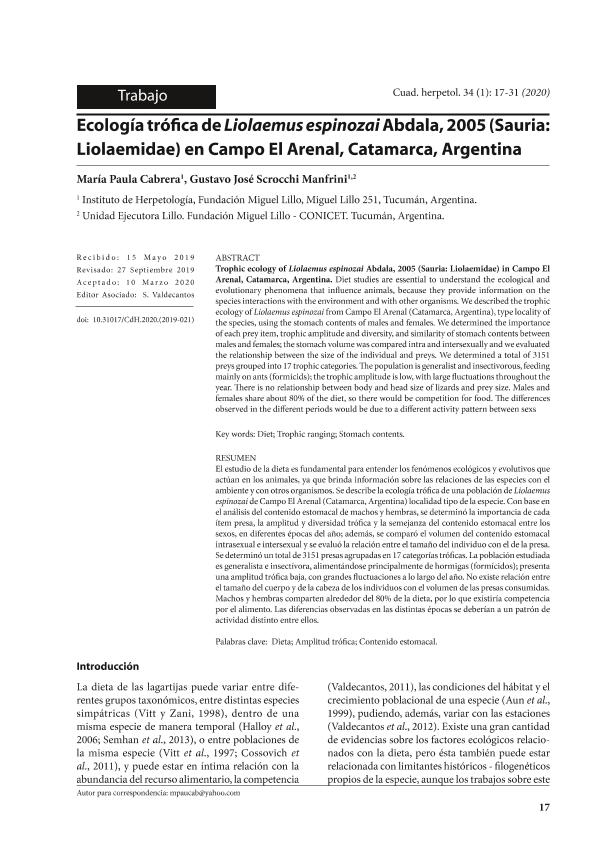Mostrar el registro sencillo del ítem
dc.contributor.author
Cabrera, María Paula

dc.contributor.author
Scrocchi Manfrini, Gustavo Jose

dc.date.available
2021-10-25T13:16:33Z
dc.date.issued
2020-04
dc.identifier.citation
Cabrera, María Paula; Scrocchi Manfrini, Gustavo Jose; Ecología trófica de Liolaemus espinozai Abdala, 2005 (Sauria: Liolaemidae) en Campo El Arenal, Catamarca, Argentina; Asociación Herpetológica Argentina; Cuadernos de Herpetología; 34; 1; 4-2020; 17-31
dc.identifier.issn
0326-551X
dc.identifier.uri
http://hdl.handle.net/11336/144893
dc.description.abstract
Trophic ecology of Liolaemus espinozai Abdala, 2005 (Sauria: Liolaemidae) in Campo El Arenal, Catamarca, Argentina. Diet studies are essential to understand the ecological and evolutionary phenomena that influence animals, because they provide information on the species interactions with the environment and with other organisms. We described the trophic ecology of Liolaemus espinozai from Campo El Arenal (Catamarca, Argentina), type locality of the species, using the stomach contents of males and females. We determined the importanceof each prey item, trophic amplitude and diversity, and similarity of stomach contents between males and females; the stomach volume was compared intra and intersexually and we evaluated the relationship between the size of the individual and preys. We determined a total of 3151 preys grouped into 17 trophic categories. The population is generalist and insectivorous, feeding mainly on ants (formicids); the trophic amplitude is low, with large fluctuations throughout theyear. There is no relationship between body and head size of lizards and prey size. Males and females share about 80% of the diet, so there would be competition for food. The differences observed in the different periods would be due to a different activity pattern between sexs
dc.description.abstract
Diet studies are essential to understand the ecological and evolutionary phenomena that influence animals, because they provide information on the species interactions with the environment and with other organisms. We described the trophic ecology of Liolaemus espinozai from Campo El Arenal (Catamarca, Argentina), type locality of the species, using the stomach contents of males and females. We determined the importance of each prey item, trophic amplitude and diversity, and similarity of stomach contents between males and females; the stomach volume was compared intra and intersexually and we evaluated the relationship between the size of the individual and preys. We determined a total of 3151 preys grouped into 17 trophic categories. The population is generalist and insectivorous, feeding mainly on ants (formicids); the trophic amplitude is low, with large fluctuations throughout the year. There is no relationship between body and head size of lizards and prey size. Males and females share about 80% of the diet, so there would be competition for food. The differences observed in the different periods would be due to a different activity pattern between sexs
dc.format
application/pdf
dc.language.iso
spa
dc.publisher
Asociación Herpetológica Argentina

dc.rights
info:eu-repo/semantics/openAccess
dc.rights.uri
https://creativecommons.org/licenses/by-nc/2.5/ar/
dc.subject
DIETA
dc.subject
AMPLITUD TRÓFICA
dc.subject
CONTENIDO ESTOMACAL
dc.subject.classification
Ecología

dc.subject.classification
Ciencias Biológicas

dc.subject.classification
CIENCIAS NATURALES Y EXACTAS

dc.title
Ecología trófica de Liolaemus espinozai Abdala, 2005 (Sauria: Liolaemidae) en Campo El Arenal, Catamarca, Argentina
dc.title
Trophic ecology of Liolaemus espinozai Abdala, 2005 (Sauria: Liolaemidae) in Campo El Arenal, Catamarca, Argentina.
dc.type
info:eu-repo/semantics/article
dc.type
info:ar-repo/semantics/artículo
dc.type
info:eu-repo/semantics/publishedVersion
dc.date.updated
2021-07-26T15:16:05Z
dc.identifier.eissn
1852-5768
dc.journal.volume
34
dc.journal.number
1
dc.journal.pagination
17-31
dc.journal.pais
Argentina

dc.journal.ciudad
San Miguel de Tucumán
dc.description.fil
Fil: Cabrera, María Paula. Fundación Miguel Lillo. Dirección de Zoología; Argentina
dc.description.fil
Fil: Scrocchi Manfrini, Gustavo Jose. Consejo Nacional de Investigaciones Científicas y Técnicas. Centro Científico Tecnológico - Tucumán. Unidad Ejecutora Lillo; Argentina
dc.journal.title
Cuadernos de Herpetología

dc.relation.alternativeid
info:eu-repo/semantics/altIdentifier/doi/http://dx.doi.org/10.31017/CdH.2020.(2019-021)
dc.relation.alternativeid
info:eu-repo/semantics/altIdentifier/url/http://www.caicyt-conicet.gov.ar/sitio/cuadernos-de-herpetologia/
Archivos asociados
